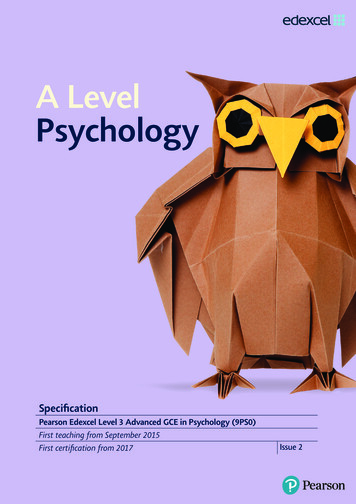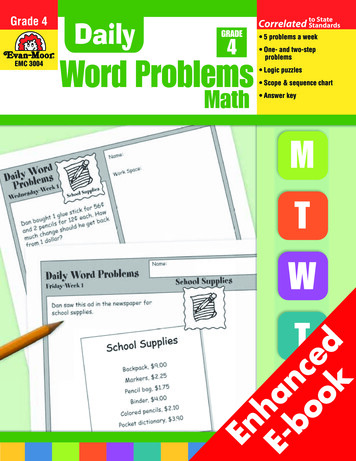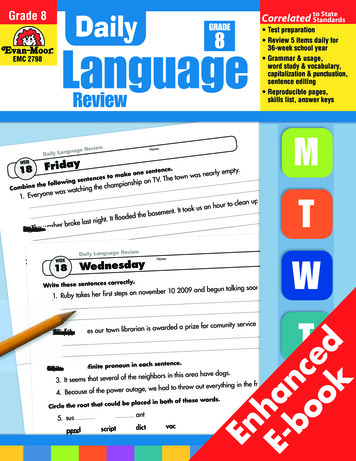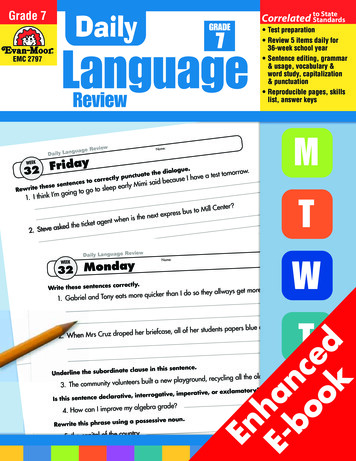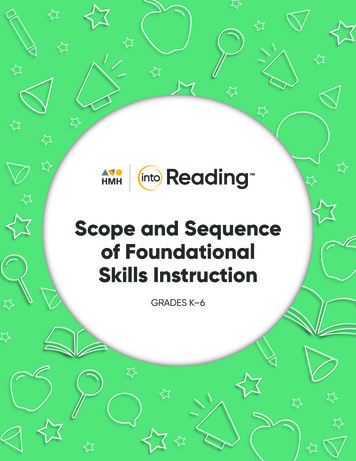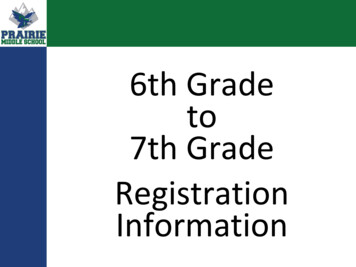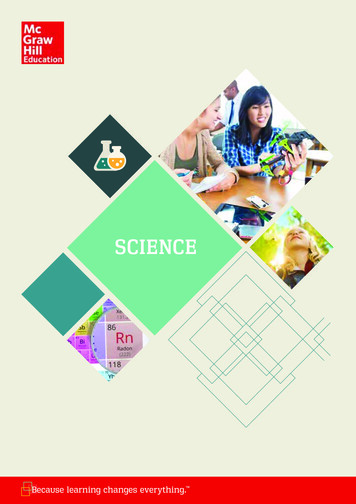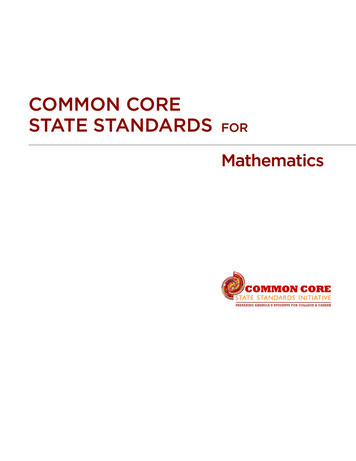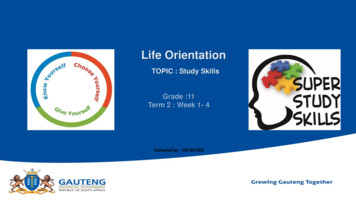
Transcription
Life OrientationTOPIC : Study SkillsGrade :11Term 2 : Week 1- 4Compiled by : CM BOTES
OVERVIEW OF SUB-SECTIONSTime management skills andannual study planGoal-setting skills:personal developmentgoals regarding study,health and fitnessSTUDYSKILLSExamination writing skills andprocess of assessmentApplying own study skills, stylesand study strategies:- Study skills: examine howlearning takes place andreflect on effectiveness- Study styles as preferred wayof approaching tasks- Study strategy as a way toapproach a specific task Inthe light of perceiveddemands
Best study strategies
WEEK 1 – Study skills, styles and strategies1. What is the difference between a:1.1Study skill ?1.2Study style ?1.3Study strategy ?Use examples to illustrate your answer.2. Study Skills: Methods you use to study.2.1What is a skill?2.2Are we born with a skill or is it taught?2.3Identify and describe at least FOUR skills are needed for effectivestudy.2.4What is rote learning?2.5List one advantage and one disadvantage of rote learning.2.6Write a list of TWO study skills that you find a challenge andevaluate how you are going to address the challenges.(3)(3)(3)(2)(2)(8)(2)(4)(6)
WEEK 1 – Study skills, styles and strategies2. Study Styles:Your brain is special and unique.Each brain prefers to study in aparticular way. Do you know whichstyle your brain prefers?2.12.22.32.4Are you predominantly left or right-brained?Explain your answer.How do the following learners learn best:2.2.1 Visual ?2.2.2 Auditory ?2.2.3 KinaestheticList ONE advantage and ONE disadvantages of each.Which styles do you use for different tasks? For example do youapproach a project, an exam and learning a sport in the same way?Justify your answer.(1)(3)(3)(3)(3)(6)(6)
WEEK 1 – Study skills, styles and strategies
WEEK 1 – Study skills, styles and strategies3. Study Strategies: This includes the where, when and what of how youstudy.Design a study strategy in which youinclude the following:3.1List your subjects from most difficult to easier. Howare you going to approach your more difficult subjects?3.2How much time are you going to spend on each subject?3.3When will you be studying more, for example in the evenings .Why will you study at that time?3.4What will you routine look like? Describe it by providingreasons for you answers.3.5Where will you study? Why will you study there?3.6Prepare a mind map of your style strategy based on theinformation you have provided above.(3)(3)(3)(4)(4)(8)
Exam writing skills
Week 2: Examination writing skills and process of assessment1. “Examinations and assessment help you keep track of yourdevelopment throughout the school year and guide you in areasthat need improvement.” Explain this statement in our your ownwords.2. How does assessment make you feel? Explain your answer.3. In order to complete examinations successfully, you haveto understand what the instruction words mean. Provide anexplanation for each of the following verbs you may encounterduring assessment:3.1Analyse3.2Comment cuss3.8Evaluate3.9Illustrate3.10 Interpret3.11 Justify3.12 Outline3.13 State3.14 State(4)(2)(28)
Week 2: Examination writing skills and process of assessment4. Distinguish between study strategies and study skills.5. Choose ONE of the following to complete the sentence:5.1Examples of school-based assessment tasks are A. homework, project and examinations.B. oral presentation, projects and assignmentsC. projects, assignments and homework.D. class work, projects and assignments.5.2One of the most effective study strategies is to A. select a place free from distraction to maximise yourconcentrationB. study continuously for at least two hours at a timeC. increase the time spend on exercise throughout theexaminationsD. Study the easiest subject first while you are fresh.6. What is the instruction word that is used in examination questionpapers to weigh up the differences and similarities between concepts?2 2(4)(1)(1)(1)
Week 2: Examination writing skills and process of assessment7. Choose the correct option:7.1 The word ‘evaluate’ in an examination instruction means to A. take apart an idea, concept or statement and to examine or criticise its subparts in detail.B. place items side by side to consider their similarities and differences to formulate a balanced(objective) answer.C. provide an itemised serious of parts, reasons or qualities, possibly in a table, and to draw a finalconclusion.D. describe, give examples, state points for and against, then to analyse and make a judgement in theconclusion.7.2 A kinaesthetic learner learns best through mime, drama, A. flash cards and discussion.B. Debate and memorisation.C. reading aloud and written instructions.D. playing games and role play.7.3 Study strategies can be defined as A. steps you take to study most effectivelyB. methods to keep track of formal assessment.C. collecting information on visual aids.Dways to solve problems and make decisions.
Week 2: Examination writing skills and process of assessment
Week 3: Time Management Skills and Annual Study Plan Answer the following questions on your timemanagement:1. Do you study better in the morning or the evening?2. Draw up a list of your subjects and otherthings you have to do. Order your list from mostimportant to the least important.Decide how long to spend on each activityand indicate it. Which activities can you postponeand which can you not?3. Based on the above, discuss your timemanagement strategy and how it can be improved.4. Analyse where you are going wrong in your timemanagement strategy.
Week 3: Time Management Skills and Annual Study Plan
Week 3: Time Management Skills and Annual Study Plan Answer the following questions on your annual study plan:1. Sit down and really think about the followingexercise. It may take a bit of time but it will endup saving you time and being more productive. Sit by yourself and write down the things thatare important to you. Now write THREEheadings: Study, health,relationships. Nowwrite the things that areimportant to you underthe above headings. You may have to add moreheadings Use these lists and design a goalsetting timetable, remember to includeshort-medium and long-term goals.
Goal-setting skills: Personal development goals regarding study, health and fitness In Term 1 we covered goal setting skills in Grade 11. These include shortmedium and long-term goals. And always remember they should be:
Goal-setting skills: Personal development goals regarding study, health and fitnessCan you identify things thatdistract you from your goals?Write them down.Do you know what youwant from life and whatyou want to achieve?Have you divided yourgoals into short, mediumand long term goals?Are your goals consistentwith your values?GOALSETTINGAre your goals realistic andhow will you measure them?How will you adapt your goalsso that when you write examsyou are focussed?
Activity
Goal-setting skills: Personal development goals regarding study, health and fitnessDevelop a plan that outlines your personal development goalsregarding study, health and fitness
Good Luck!
SKILLSgoals regarding study, Applying own study skills, styles and study strategies: -Study skills: examine how learning takes place and reflect on effectiveness -Study styles as preferred way of approaching tasks-Study strategy as a way to approach a specific task In the light of perceived demands Time management skills and annual study plan
